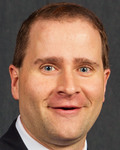The “What I Wish I Knew” series of articles is a service of CPNP’s Resident and New Practitioner Committee. Articles are intended to provide advice from experts for students, residents, and new practitioners. Articles are not intended to provide in-depth disease state or pharmacotherapy information nor replace any peer-reviewed educational materials. We hope you benefit from this “field guide” discussing approaches to unique problems and situations.
 Christopher Thomas, PharmD, BCPS, BCPP, is the Clinical Pharmacy Specialist in Psychiatry and Residency Program Director of the PGY-1 and PGY-2 (Psychiatry) residencies at the Chillicothe VAMC. He is also appointed Clinical Associate Professor of Pharmacology at Ohio University Heritage College of Osteopathic Medicine.
Christopher Thomas, PharmD, BCPS, BCPP, is the Clinical Pharmacy Specialist in Psychiatry and Residency Program Director of the PGY-1 and PGY-2 (Psychiatry) residencies at the Chillicothe VAMC. He is also appointed Clinical Associate Professor of Pharmacology at Ohio University Heritage College of Osteopathic Medicine.
Board Certified in Psychiatry and Pharmacotherapy, Dr. Thomas completed his Doctor of Pharmacy Degree at Butler University in Indianapolis, IN. He completed a specialty pharmacy practice residency in psychopharmacology/psychiatric pharmacy practice at the Cleveland VAMC.
He is an active member in several pharmacy organizations and has served in various leadership roles, including being a past president with the American Association of Psychiatric Pharmacists (AAPP) and currently the AAPP Foundation President.
This is an exciting albeit stressful time of year for residents. All the projects, presentations, and responsibilities are coming together, however, the pressure of finding a job is starting to weigh on your mind. In this article, I hope to provide some guidance on landing that first job!
As you first ponder your career options, be realistic and have a clear definition of what you like, where you want to go, and what position you want. In addition, identify your strengths and weaknesses. Opportunities may seem limited at first, but you need time and experience; your first job may not be your dream job, but rather, a step in the right direction. Knowing your interests within various practice settings (academia, inpatient, outpatient, government, industry, private sector, etc) will go a long way in helping narrow your search. Please be encouraged by the high demand for psychiatric pharmacists and the wide range of positions available for psychiatric practitioners.
My first recommendation when looking for your first job is to keep all options open. Unfortunately, many people limit themselves by trying to find a perfect job in a specific geographic area. Opportunities will pass you by if you limit yourself and your search to one region. There are many factors to consider as you look for your first job (family, significant others, etc), but you will have many more options if you consider a larger geographic search.
Networking is also critical when looking for employment. Even though you may not feel you have connections, former preceptors, residency program directors, and colleagues can help guide you. Many pharmacy specialties are small communities, including psychiatric pharmacy. Job postings may become available, but not publicly announced. Therefore, having colleagues that are aware of opportunities can be an important step in finding your first job.
In my experience interviewing hundreds of residency candidates, I have a few tips to provide that are important and essential to me and my practice site and probably many others across the country.
- Be on time and be prepared. First impressions are important. If you are late and unprepared, the interview is over before it begins. Also, educate yourself on the practice site and services available at that facility along with the hospital and department Mission and Vision Statements. Simple internet searches about the health system, college, and/or company can go a long way in informing you about the employer, the employment opportunity, and the culture at that facility. It is also important to contemplate questions you feel might be asked about you and your experiences. Performance-based questions are utilized on almost every interview that I have been a part of. Thus, practicing how to answer these questions are important in performing well in the interview. For more information about performance based questions, visit https://www.va.gov/pbi/.
- Prepare questions to ask the practice site in advance. By asking thoughtful questions about the job, you will demonstrate your interview preparation and that you are genuinely engaged and interested in the available position.
- Be cognizant of how you are being perceived. The number one trait I look for in a residency candidate or colleague is their predicted ability to be a team player and receive feedback. If this appears problematic during an interview, it will likely become problematic during a course of employment. Working well with others and accepting constructive criticism are essential qualities for my program and many others alike; lack thereof disqualifies potential candidates for hire. I realize that most of these tips might seem simplistic, but I strongly emphasize that you convey preparedness and the ability to work well with others during your interviews.
Once you land your first job, I strongly encourage you to consider board certification(s), continue to expand and perfect your practice, become professionally involved in CPNP, and dedicate yourself to lifelong learning. Hard work, credibility, and networking will help create more opportunities within your facility and perhaps beyond.
Again, I wish you the best during this stressful time. Remember to lean on your friends, family, and colleagues for guidance during this time and I wish for the best in future endeavors.
